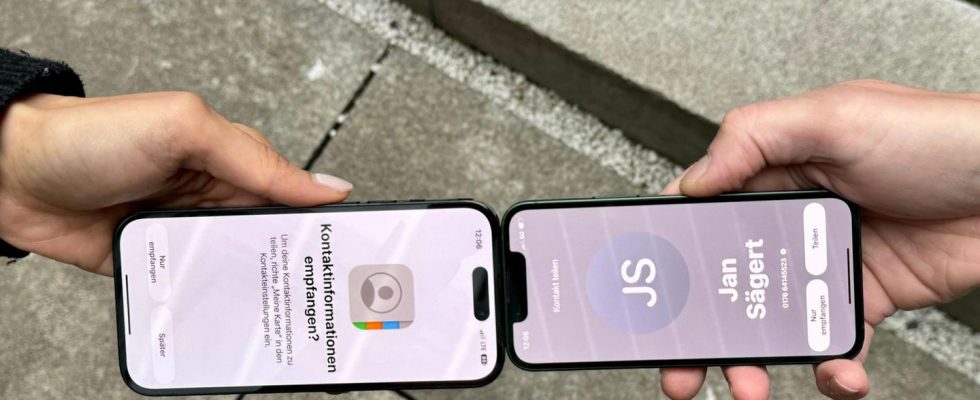Namedrop
The US police warn about a new iPhone function – that’s what’s behind it
The namedrop introduced with iOS 17 allows contacts to be easily shared between iPhones
© Malte Mansholt / stern
Since the introduction of iOS 17, it has been easier to share your contact information with another iPhone. Here you will find out why you should be careful – but there is no real reason to worry.
“Type in your number” – this sentence has been said and heard far too often since the advent of cell phones. With iOS 17, Apple made sharing contacts easier, at least for iPhone users: With the “Namedrop” feature, you can exchange your contact details simply by holding the devices together. Now numerous police departments in the USA are warning about this.
In largely identical Facebook posts, authorities in Ohio, Pennsylvania, Oklahoma and other states warn about the function, as the Washington Post first reported. “If you use an iPhone and have performed the recent iOS 17 update, a new feature called NameDrop has been turned on by default,” it says alarmistically. “This feature allows sharing contact information simply by bringing your phones close.” There are instructions on how to switch off the function. The additional warning to check children’s devices also reinforces the feeling of danger.
+++ Also read: You should definitely know these well-hidden features of iOS 17 +++
iPhone feature namedrop: No need to panic
This concern is actually so misplaced that one could call it scaremongering. Although Namedrop actually works as described by the police – you hold the devices together and can immediately exchange contact – accidental exchange and thus unwanted sharing of your own data is theoretically possible, but in practice it is almost impossible.
Although Namedrop is based on the well-known data transfer feature Airdrop, Apple has incorporated some additional protective measures. While Airdrop can establish its direct Wi-Fi connection between devices over several meters, Namedrop only works if the devices are kept together within a few centimeters.
And even then the data is not simply transferred. The option to share your data only appears when both devices are unlocked. You can then select which data will be transferred – and then have to confirm again. In order for accidental transmissions to occur, as suggested by the Facebook posts, a number of carelessnesses would have to come together.
If you still want to switch off the function, this option can be found in the settings under “General”, “Airdrop” and “Keep devices together”.
6 pictures
“I find the drama a bit irritating”
Some of the Facebook followers of the police accounts also note this. “My husband and I have been playing around with it,” says one user. “You literally have to hold the phone directly against the other phone for it to be recognized,” she reports. “That’s correct,” confirms another user. “You have to also initiate the transfer itself. I find the drama here a bit irritating.” Others, however, thank everyone for the posts and report that they turned off the function immediately.
Police departments respond very differently to the feedback. The Cester police simply turned off comments on the post, while the Noble County police simply did not respond to the information cited above. The Dewey County office has since adjusted the post. The main aim was to get the parents to talk to the children, and they are now trying to defend the post there. However, there is still no admission that the danger has been exaggerated.
Sources: Police Facebook accounts Chester, Noble County and Dewey, Washington Post


